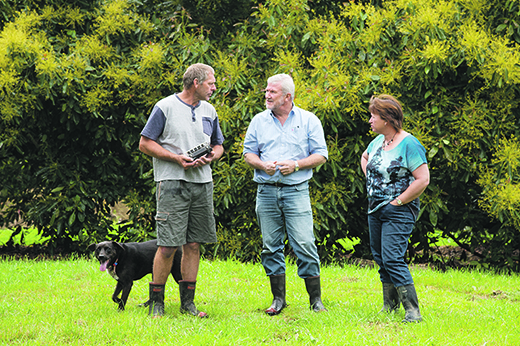Colin Partridge describes himself as “a Kiwi who just talks funny”. The accent is from South Africa – a country that gave him a childhood, an education, and a grounding in the avocado industry upon which he has built a career.
After studying horticulture at the University of Natal in South Africa Colin worked in the citrus industry before joining the South African Avocado Growers’ Association, working his way up to managing director.
Nowadays, Colin’s knowledge benefits 830 growers through Avoco, where he works as technical manager. He sees his role as “bridging the divide between science and growers, relaying that information in a way they understand”.
Pictured with Mike and Jillian Royacker in their orchard, Colin Partridge says avocado growers the world over are a great bunch of people.
Technical challenges
Last season’s crop had problems with a fungal rot. In response, Colin has been urging growers to spray copper and educate them about the benefits of removing dead wood through pruning and mulching to let more light in and improve spray penetration.
Colin remembers a time when growers were reluctant to prune, thinking that thinning or reducing tree height would reduce crop volumes. Now, it’s widely recognised that pruning can boost production by helping to overcome the alternate bearing patterns of trees and improve spray efficiency.
Although the roaring of chainsaws is a familiar sound on orchards now, Colin advises new growers to seek advice first. “What’s different for us in New Zealand, is that we most often have fruit hanging on the tree when we want to prune. We have to work around what else is happening in the orchard to get it right.”
Worldwide boom
The burgeoning importance of the avocado industry is demonstrated by increased attendance at Avoco field days and the willingness of growers to participate in research.
The downside to this is that “sometimes growers can be too open-minded, making them vulnerable to unscrupulous people who pedal the pseudo-science range of products”.
New Zealand growers also grapple with a climate that challenges the avocado’s tropical preference, leading to irregular and alternate bearing.
This is especially noticeable in spring, when trees are flowering and trying to set fruit against a backdrop of wind, rain and chilly nights. Frosts can ruin a crop, which Colin says can be “soul-destroying” for growers.
Colin says it’s essential to follow the basic rules of planting the best-quality trees obtainable in well-drained soils in locations conducive to fruit set, establishing wind shelters, irrigating properly and controlling phytophthora. “Tick all of those boxes and you can be very successful.”
The future
Field research and technology are expected to help growers maximise their crops to meet increasing export demand in future. He hoped it would one day be possible for growers to be able to use drone technology to better estimate their crop volumes – a move he says would be “a game-changer” for the industry.
Then there’s the possibility of reducing picking costs by “plucking” avocados from trees – a method not practiced in New Zealand because it often causes stem-end rot.
“If it was possible to solve that problem, there would be massive savings for growers.”
As for Colin’s future, it definitely involves New Zealand. He became a citizen more than a decade ago and – in response to that most important of questions – says that he does support the All Blacks against the Springboks.
He also enjoys the people he works with. “Avocado growers tend to be a rather nice bunch of people. They are hospitable, resilient and honest as the day is long.”



0 Comments
Leave a Comment